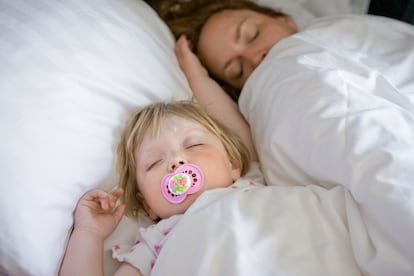Does your child snore? Why this happens and how it can be alleviated
Genetics, obesity, respiratory diseases or environmental issues, such as passive smoking, influence whether a child snores, a problem that affects their quality of rest and their daily lives

When is a child considered a snorer? When, without having a cold, they snore three days a week for more than 21 days in a row. Between 10% and 20% of children do this, especially up to the age of four. “At this early age, the tonsils and adenoids are usually larger, which influences breathing less fluently,” according to a 2011 study by the Active Training in Primary Care Pediatrics (FAPap), the most complete on the subject to date and which will be updated in a few months, according to the organization. After the age of nine, the number of snoring children decreases because the physiology of the respiratory system has matured, the study adds.
Children of snoring parents are more likely to snore. “There are genetic factors that favor both nocturnal snoring and obstructive sleep apnea/hypopnea syndrome (OSAHS), or a breathing pause of more than 20 seconds during sleep. We usually tell these families what a symphony orchestra they must have at night,” says Elena Alonso, associate head of the pediatrics department at the Rey Juan Carlos University Hospital in Madrid.
Another influential factor is excess weight. “Childhood obesity causes nocturnal snoring in childhood to appear earlier; it is prolonged and worsens,” adds Alonso. This physician points out other physical issues that favor snoring: “Retrognathia, or a short and small lower jaw, a narrow palate, or having some other circumstance — such as Down syndrome — that reduces the strength of the head and neck muscles.”
Snoring can lead to apneas or respiratory arrest during sleep, which is what most affects the quality of rest. “About 20% of children who snore will have these pauses in breathing, which causes sleep to be fragmented, not restorative, and not conducive to the proper functioning of the brain’s memory function,” says Alonso. “These are children who wake up many times during the night and adopt many postures. Some of them who were already not wetting the bed may lose sphincter control again.”
It is neither healthy nor normal for a child to snore and it affects the dynamics of their waking life. “They are more irritable, their academic performance decreases and they can be more sedentary or, on the contrary, more hyperactive than normal,” explains Gonzalo Pin, coordinator of the Sleep and Chronobiology Group of the Spanish Association of Pediatrics (AEP). According to Pin, it should be taken into account that the human throat has changed over time to adapt to language and swallowing: “If we did not speak, we would snore less, but children are also influenced by issues such as the use of pacifiers beyond the age of four — since it narrows the palate — a sedentary lifestyle, or taking all food in crushed form because this prevents the strengthening of the facial muscles.”
Other issues that increase the possibility of a child snoring are environmental and health factors. “Allergies, respiratory infections, asthma or exposure to tobacco,” as detailed by Carlos Torres, pediatric pulmonologist at the Rey Juan Carlos University Hospital. There are several guidelines that help reduce nocturnal snoring. “Clean the nasal passages with saline solution, avoid dryness in the environment with a humidifier, avoid [the child] being overweight or sedentary, and consult a specialist to monitor the child,” Torres explains.
Sleep hygiene
Ensuring appropriate sleep patterns — what specialists call good sleep hygiene — helps a child to snore less. Helena Larramona, a specialist in pediatric pulmonology and member of the AEP Sleep and Chronobiology Group, advises: “Get enough sleep and avoid big differences in sleeping hours between the break from Monday to Friday and the weekend: at the most, one hour.” Larramona highlights other issues regarding a proper nighttime sleep routine related to the place where the child rests: “The bed should be only for sleeping. The child should not be allowed to fall asleep on the sofa and carried into the bedroom, bearing in mind that one of the characteristics of snoring children is that they fall asleep in an instant when they lie down.”
Physical activity also favors proper rest for a snoring child. According to Larramona, it is advisable to exercise at least three hours a day, as well as to be exposed to sunlight to regulate the biorhythms between wakefulness and sleep.
Sign up for our weekly newsletter to get more English-language news coverage from EL PAÍS USA Edition
Tu suscripción se está usando en otro dispositivo
¿Quieres añadir otro usuario a tu suscripción?
Si continúas leyendo en este dispositivo, no se podrá leer en el otro.
FlechaTu suscripción se está usando en otro dispositivo y solo puedes acceder a EL PAÍS desde un dispositivo a la vez.
Si quieres compartir tu cuenta, cambia tu suscripción a la modalidad Premium, así podrás añadir otro usuario. Cada uno accederá con su propia cuenta de email, lo que os permitirá personalizar vuestra experiencia en EL PAÍS.
¿Tienes una suscripción de empresa? Accede aquí para contratar más cuentas.
En el caso de no saber quién está usando tu cuenta, te recomendamos cambiar tu contraseña aquí.
Si decides continuar compartiendo tu cuenta, este mensaje se mostrará en tu dispositivo y en el de la otra persona que está usando tu cuenta de forma indefinida, afectando a tu experiencia de lectura. Puedes consultar aquí los términos y condiciones de la suscripción digital.









































